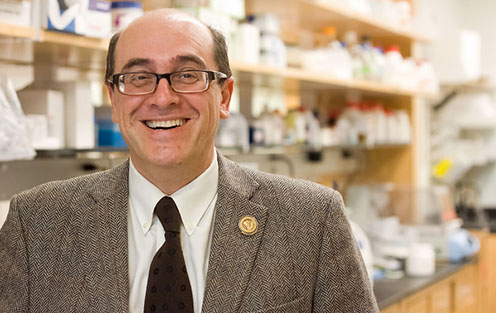The university has received a grant from the National Institutes of Health to create a postdoctoral training program in cancer nanotechnology within the UNC Eshelman School of Pharmacy.

A federal grant awarded to the University of North Carolina at Chapel Hill will help grow the workforce of scientists and doctors working in cancer nanotechnology through the launch of a new postdoctoral training program.
The university has received a $1.8 million, five-year grant from the National Institutes of Health to create a postdoctoral training program within the UNC Eshelman School of Pharmacy’s Center for Nanotechnology in Drug Delivery. The program will be run in collaboration with the Carolina Institute for Nanomedicine, the Carolina Center for Cancer Nanotechnology Excellence and the UNC Lineberger Comprehensive Cancer Center. The award, a T32 training grant, was awarded through the Ruth L. Kirschstein National Research Service Award program.
“The University of North Carolina at Chapel Hill has one of the strongest and finest programs in cancer nanotechnology research due to work done across the last 10 years at our nanotechnology-focused centers and institutes,” said Alexander Kabanov, Ph.D., D.Sc., Mescal S. Ferguson Distinguished Professor in the UNC Eshelman School of Pharmacy, a UNC Lineberger member and director of the Center for Nanotechnology in Drug Delivery as well as of the training program. “But until now, we have not had a formal training program in this field. This new program will build upon our already increasing successes, expanding the focus from the development of innovative cancer diagnosis and therapy technologies to also building the workforce in this field nationally and in the state of North Carolina.”
The training program will aim to recruit trainees with diverse backgrounds, including both fellows with doctoral or medical degrees. Three trainees will join in the first year, starting in the fall. The program will expand to six trainees in the second through the fifth years. Fellows will have the opportunity to work with faculty from 11 different departments and three schools at UNC-Chapel Hill. The faculty have expertise in disciplines encompassing physical and material science, biomedical engineering, basic biomedical science, science to clinical oncology.
The program’s multidisciplinary approach will help set it apart, said Andrew Wang, M.D., a UNC Lineberger member and associate professor in the UNC School of Medicine Department of Radiation Oncology. Wang, who also has an appointment in the Center for Nanotechnology and Drug Delivery at the UNC Eshelman School of Pharmacy, is the training program’s co-director.
“We think the trainees coming out of this program will be very well-rounded, and will be much better equipped to take on the next set of challenges; the cutting-edge research questions,” Wang said, explaining that program will offer instruction in clinical oncology, cancer biology as well as in nanotechnology. “We aim to attract trainees with diverse backgrounds, not just in chemical engineering, which dominates the landscape right now. We also want to train cancer biologists and clinician scientists, who will be critical in furthering nanomedicine research.”
Cancer nanotechnology is already an active area of research, Wang added.
“There are many ways that nanotechnology can intersect with cancer research, both in the diagnosis of disease and in its management,” Wang said.
“We hope research in this field will lead to revolutionary advances in how cancer is treated and diagnosed,” Kabanov said.
